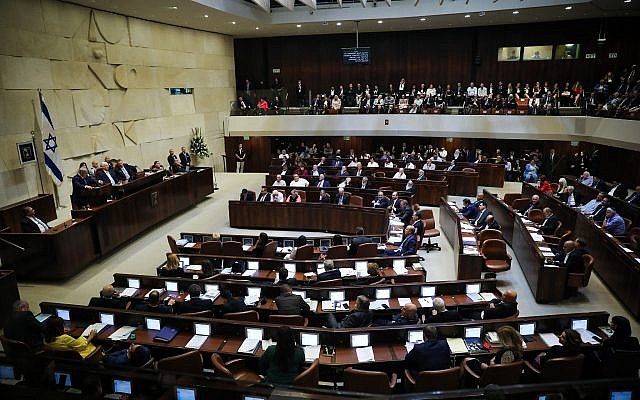Speaker Yuli Edelstein implores voters to register to vote in party primaries and keep provocative politicians out of parliament

Prime Minister Benjamin Netanyahu and Knesset chairman Yuli Edelstein issued harsh rebukes Wednesday for Israeli politicians who lower the level of public discourse, following recent incidents in the Knesset where lawmakers have been criticized for using offensive smears against their colleagues.
“The recent remarks heard in the Knesset are not appropriate and they have no place in the Israeli discourse,” Netanyahu tweeted. “I am in favor of sharp debate and from time to time even stinging, as long as they uphold respect and relate to the matter at hand and not the body of the person. I am against hurtful or chauvinistic discourse that doesn’t honor the Knesset or us as elected representatives.”
Edelstein called on members of the Israeli public to vote out such lawmakers, urging the public to register for party primary elections so that they can prevent uncouth politicians from winning a seat in parliament.
The appeals came after two incidents in the Knesset — one in which a lawmaker called a wheel-chaired colleague “half a human” and another in which an MK appeared to suggest that a female minister had advanced during her military career by sleeping with her superiors.

“In the last 24 hours, I have received many complaints regarding the conduct of MKs in the plenum,” Edelstein wrote in statement posted to his Facebook page. “Unfortunately, this is not a new matter.”
“The message I want to convey to you is this one: democracy is the rule of the people,” Edelstein said. “You, the citizens, choose who will get to sit in the Knesset and represent you and who will remain on the outside.”
“By registering for membership in parties, for example, you can influence the list that the party presents to the Knesset,” Edelstein continued.
“Stop encouraging the members of Knesset on social [media] networks. Show those MKs who are trying to get publicity through provocation that you can not be bought with dirty talk,” he said. “You are the ones who choose the public representatives and don’t forget that. Only you can decide who sits here in the Knesset and who is left outside — that is democracy.”
Not all of Israel’s political parties use the primary system but those that do include the ruling Likud party, the Labor Party, Jewish Home and Meretz.

Opposition MK Yair Lapid, who leads the Yesh Atid party, tweeted his support for Netanyahu. It was a Yesh Atid MK who made the comments regarding Culture and Sports Minister Miri Regev’s military service.
“I join the prime minister,” Lapid wrote. “The divisive and inciting discourse is dangerous and is breaking us apart from the inside. I call on Netanyahu to sign us on to the Discourse Charter and together lead the process for the sake of unity in Israel and the Israeli people.”
The Charter for Israeli Discourse is a grassroots effort led by the Darkenu movement to formulate a document describing how public discourse should be held in Israel.
According to its Facebook page the charter “calls on Israel’s leaders to demonstrate transparency and greater sincerity of purpose, and encourages dialogue free of divisiveness, hatred and incitement, including the banning of publications that are violent or racist in character.”
As reported by The Times of Israel
